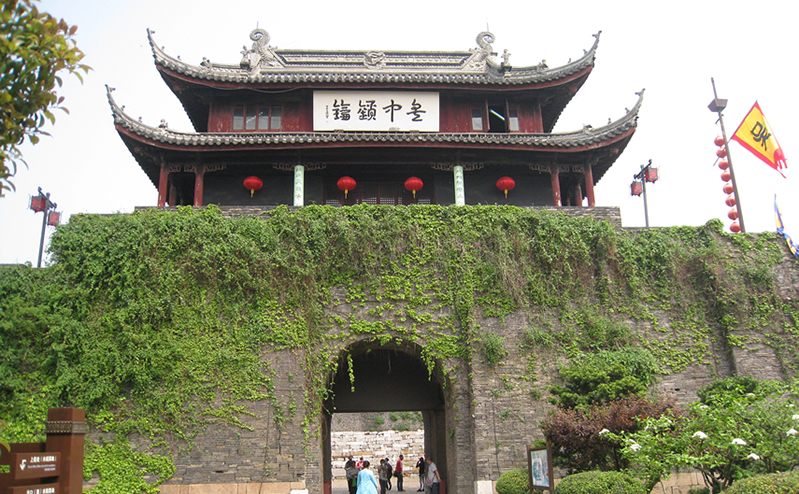24 Hours Hotline: +86 137-3541-1378
Email:suzhou@tripstoshanghai.com
24 Hours Hotline: +86 137-3541-1378
Email:suzhou@tripstoshanghai.com

Overview
"In heaven, there is paradise. On earth, there are Suzhou and Hangzhou." Suzhou, Long regarded as a representative of southern small towns in China since the history of its own written records lasted for 4000 years, 514 BC, is one of the world's leading tourist destinations now. It is situated on the southern section of the Grand Canal on a generally flat, low-lying plain between the renowned Lake Tai to the west and the vast Shanghai metropolis to the east. It is a major economic centre and focal point of trade and commerce, and the second largest city in Jiangsu Province after its capital Nanjing.
For 2,500 years, Suzhou has miraculously kept the basic layout of its old town area. Because of its excellent geographical features, specialties and historic relics, Suzhou has been honored with loads of titles such as Venice of the East, City of Classic Gardens, City of Literates, City of Silk and Heaven on Earth.
The long history of Suzhou city has left behind many attractions with beautiful legends. The elegant classical gardens, the old fashioned houses and delicate bridges hanging over flowing waters in the drizzling rain, and the exquisite arts and crafts have made Suzhou a renowned historical and cultural city full of poetic charm. And its cultural and economic influence throughout the history has made it one of the most important urban areas in China and the world.
From Spring and Autumn Period to Qin and Han Dynasties
Suzhou, the cradle of Wu culture, is one of the oldest towns in the Yangtze Basin. About 2,500 years ago in Shang Dynasty, local tribes named Gou Wu lived in the area which would become the modern city of Suzhou. In the Spring and Autumn Period, it was named the Great City of Helü, as the capital of the Wu Kingdom. Wu Zixu, the prime minister of King Helü, supervised the reconstruction of Suzhou, which marked the beginning of the current city. In 473 BC the Wu Kingdom was defeated by the Yue Kingdom, a kingdom to the east which was soon annexed by the Chu Kingdom in 306 BC. The golden time of Suzhou came to an end with this conquest.
Sui and Tang dynasties
The city began to prosper during the Sui Dynasty as a result of the construction of the Beijing-Hangzhou Grand Canal, and it was renamed to Suzhou in 589 AD. When the Grand Canal was completed, Suzhou found itself strategically located on a major trade route. With the prosperous business of silk and other popular products along the waterways, Suzhou has been a metropolis of industry and commerce on the south-eastern coast of China.During the Tang dynasty, the great poet Bai Juyi constructed the Shantang Canal (better known as "Shantang Street") to connect the city with Tiger Hill for tourists.
Song and Yuan Dynasties
Since the Song Dynasty,the city has been a major center for the silk trade and continues to hold a prominent position in this industry today. Prosperity and a developed culture attracted imperial attention to Suzhou, and by 1035 (during the Northern Song Dynasty) it had become an important port city. In AD 1035, the city of Suzhou saw the construction of the first Confucius temple which would later become an imperial civil examinations venue and much later Suzhou High School in 1910s. The city went through difficult times during the Jin and Yuan Dynasties. It was ransacked several times in the 12th, 13th and 14th centuries. By the 14th century, Suzhou had established itself as a leading silk producer, attracting aristocrats, scholars, artists and actors. It was during this time that the construction of the city's renowned gardens began. The city was well documented in the writings of Marco Polo, who noted the large number of scholars and people that were "skillful in all the arts".
From Ming and Qing dynasties to modern times
During the Ming and Qing Dynasty, Suzhou was the nation's economic, cultural and commercial center, as well as the largest noncapital city in the world, many of the famous private gardens were constructed by the gentry of the Ming and Qing dynasties.However, the good fortune of the city had run out since then. The city witnessed another disaster in 1860 when Taiping soldiers captured the city. In November 1863, the Ever-Victorious Army of Charles Gordon recaptured the city from the Taiping forces. And the next crisis was the Japanese invasion in 1937. Many gardens and other historic relics were devastated by the end of the war.
Today
After the establishment of People's Republic of China, restoration was done on gardens such as the Humble Administrator's Garden and the Lingering Garden to bring them back to life. Like the proverbial phoenix, Suzhou has burned and re-emerged from the ashes more prosperous and beautiful than before on a number of occasions, and what remains today is one of China's most beautiful cities, while the economic boom since the opening up of China's economy in the 1980s has made it an attractive target forinvestment in high-tech industries.
In 1981, Suzhou City was listed by the State Council as one of the four cities with historical and cultural heritage protection. Accordingly, this city has developed into one of China’s most prosperous, gaining in popularity as a tourist destination.
In the 1990s, two major industrial parks were developed: the Singapore Industrial Park (SIP) and the Suzhou New District, where 20 percent of the Fortune 500 corporations have established a base in Suzhou.
In 2014, the Grand Canal was inscribed to UNESCO’s World Heritage List. With high life expectancy and per capita incomes, Suzhou's Human Development Index ratings is roughly comparable to a moderately developed country, making it one of the most highly developed and prosperous cities in China.
Wechat: Chinaprivatetour
24 Hours Hotline:
+86 137-3541-1378
* Authentic Experiences: Genuine local experiences that immerse you in the true essence of Suzhou and beyond.
* Safety First: Highest safety standards with secure activities and reliable transportation.
* Customizable Tours: Flexible itineraries tailored to your interests and needs.
* Local Expertise: In-depth knowledge of Suzhou and China, offering exclusive insights.
* Professional Guides: Licensed bilingual guides with over 5 years of experience.
* Comfortable Travel: Experienced drivers and well-maintained vehicles for a smooth journey.
* Sustainable Tourism:Commitment to responsible tourism and supporting local communities.
* Customer-Focused: Personalized service and continuous improvement based on your feedback.
* Free Cancellation: Cancel up to 24 hours before travel for flexibility and peace of mind.
* 24/7 Support: Round-the-clock assistance for any questions or help needed.
 Tiger Hill (Huqiu) Travel Guide: Exploring Suzhou’s Iconic Leaning Pagoda
Tiger Hill (Huqiu) Travel Guide: Exploring Suzhou’s Iconic Leaning Pagoda Exploring Suzhou No. 1 Silk Factory: A Journey into the Heart of China’s Silk Industry
Exploring Suzhou No. 1 Silk Factory: A Journey into the Heart of China’s Silk Industry Exploring Guanqian Street in Suzhou: A Blend of Tradition, Shopping, and Local Flavors
Exploring Guanqian Street in Suzhou: A Blend of Tradition, Shopping, and Local Flavors Humble Administrator’s Garden Suzhou: Complete Visitor Guide to Zhuozheng Garden, History, Highlights & Tips
Humble Administrator’s Garden Suzhou: Complete Visitor Guide to Zhuozheng Garden, History, Highlights & Tips Song He Lou Suzhou: A Culinary Journey through Suzhou’s Historic Songhelou Restaurant
Song He Lou Suzhou: A Culinary Journey through Suzhou’s Historic Songhelou Restaurant Yangcheng Lake Hairy Crab Guide: The King of Crabs in China
Yangcheng Lake Hairy Crab Guide: The King of Crabs in China Master of the Nets Garden Suzhou: A Complete Guide to China’s Most Exquisite Classical Night Garden
Master of the Nets Garden Suzhou: A Complete Guide to China’s Most Exquisite Classical Night Garden Jinji Lake Suzhou Travel Guide: What to See and Do Around Suzhou’s Modern Landmark
Jinji Lake Suzhou Travel Guide: What to See and Do Around Suzhou’s Modern Landmark1 to 1 tailor-made service from our professional travel advisors for the most sophisticated
Constantly excellent reviews for attraction, hotel and service Competitive price
Local experts provide quality tours Best selected knowledgeable local guides Authentic local restaurants
7*24 hours available to create you a worry-free tour. No Hidden Fees and absolutely no pressure to buy. Secured









Copyright © 2017 Suzhouprivatetour.com All rights reserved. 浙ICP备18056007号-4